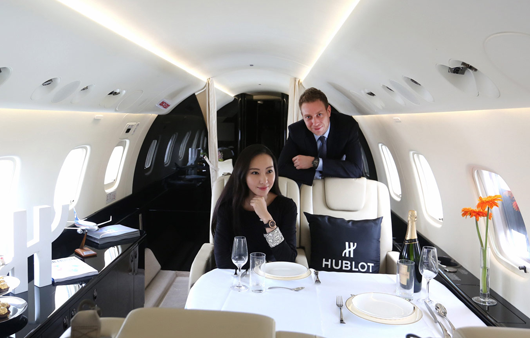Project Description
“Define today’s luxury jewellery and watch clients around the world”
THE CONTEXT OF THE RESEARCH
A Switzerland-based luxury goods holding company that owns several of the world’s leading companies in the field of luxury goods, with particular strengths in jewellery, watches and writing instruments wanted UniqueView to conduct some home interviews in Shanghai and Beijing to help understand and define today’s luxury jewellery and watch clients in China and describe their lifestyle, their values, their relation to luxury, and their expectations towards luxury brands.
OVERVIEW
To meet these objectives UniqueView conducted 10 home interviews in Shanghai and Beijing with respondents who fit into 5 different profiles of wealthy luxury consumers. This methodology was picked as, along with the interviews, this allowed us to create ethnographic videos of them inside their homes with them showing us their various relevant items such as their jewellery box, their watch safe, their dressing room, their bag collection, etc.
The client wanted to interview luxury jewellery and watch clients from each of the following five profiles:
CONSERVATIVE
- In his/her fifties, man/woman with children (Upper East Side NY, etc.)
- Values = traditions from wealthy class, family, admitted conventions (Parisian bourgeoisie, East Coast Ivy League…)
- Rather introverted, with a social life in line with his/her social class
- Values a lifestyle inherited from the past (comes from a wealthy family)
- Pragmatic approach towards luxury : every luxury spending must be justified, and the investment value is a very strong reason why to justify this spending
- Conservative choices : established brands, strong habits, no rupturist/break-through choices
- Favour special occasions for the purchases and gifts (e.g. jewellery for the spouse)
- Reasons for choosing luxury items : safe bet, long-term, investment
- Sensitive to rational proofs & arguments, to reassuring speech, safe investments
- He can also be watch collector yet more into buying several Patek than daring purchasing less conventional brands
= a « patrimonial » relationship to luxury : he/she was required to explain this patrimonial relationship towards beautiful luxury items, but also more generally in life, how luxury reinforces their vision of a steady world, has an intrinsic value that can be passed on
INSIDER
- Well represented in France among « very wealthy » people, men and women
- Leads a very busy lifestyle, professional & social, strong ego, anxious about their position of power in the society, they have trendy tastes (or are at least sensitive to novelty, sophistication), can possibly purchase art as a “social indicator”
- Luxury is a lifestyle (with boxes to tick to be part of it), they want to belong to this « luxury planet » while differentiating themselves from newly wealthy
- Luxury is also a way to convey power, position in the society, while not being too ostentatious and always reinforced by the “cultural credential of luxury” and thus to the brand storytelling, stories they will tell spontaneously
- They are connoisseurs, adopt the expected discourse of sophistication : power but also knowledge, legitimacy; niche brands. They are thus multi-faceted with no faux-pas
- Men are connoisseurs in watchmaking and always prefer the ‘best’ (ex. Patek) in its latest version (ex. Patek vintage car branché)
- Women are connoisseurs in jewellery, they like bold jewellery (size, color…), justified by a story that legitimize themselves/ raise their self-esteem (ex. Panthère Cartier as it is an historical symbol of the brand …)
= despite their comprehensive and without faux-pas discourse, their key driver is their “elitist” relationship to luxury : they have to tell the importance of being “recognized/considered” by the brand to confirm they stand out from the crowd
CONSPICUOUS
- Key profile in China (men & women) : younger, second generation of wealthy Chinese, anxious to look refined/sophisticated (more « evolved» than their parents, than Chinese middle-class) in order to show social distinction
- This sophistication mainly goes through novelty, trendiness (even though today, legitimacy is a must-have for a luxury brand)
- They have gone beyond the « basics » of the brands but have not given up the visible & recognizable status : they are willing to buy « enhanced» versions of the icons (Cartier love pavé)
- They are buyers of trendy, newly-launched products, they are not really loyal to specific brands as long as they are well-known
= they have a “utilitarian” relationship (almost moderate/lukewarm) to luxury : they must explain how luxury helps them to be trendy, gives them self-confidence, power, social importance towards others
ASPIRANT
- Typically young upper middle class couples (not the wealthiest), in China
- Very active social & cultural lifestyle (opening of an exhibition, preview, etc.)
- An aesthete attitude towards the things they like: speak about beauty, art, have refined tastes
- Speak about discernment more than spending power (culture and taste come before)
- Luxury is, among other fields, an expression of the beautiful and a “culture in itself” : they are sensitive to the aesthetics of the items , but also to craftmanship, authenticity (“True” also matters to them)
- Also likely interested in Fashion
- They are consensuals (not rupturists/innovators) yet not really conservative
- Later they could become Conservatives or Insiders
- Spend rather less than the other profiles, less frequent / more occasional buyers, but not because of lack of interest : they would spend more if they could
= they have an « aesthete » relationship to luxury: they must elaborate on the importance of “the beautiful” in their life and the position of luxury in this quest
DISCREET
- The other type of « light » occasional buyers : likely from any ages, including younger
- They are also occasional buyers with an intermediate spending power, more distant towards luxury than Aspirant
- Probably the less defined, but also the more numerous as they belong to the « bulk of luxury occasional buyers »
- A moderate even slightly distant relationship towards luxury : it is an occasional status symbol, to mark an important moment (special events purchase), boost one’s ego, reward oneself
- The substantial expenditures should thus be more varied than just watch/jewellery : trips, furnitures…
- They are really not « luxury fans » : they do not think they belong to this world
- This moderate interest towards luxury explains their relative distance and lack of knowledge of the brands and of their storytellings : they prefer safe choices, long-term, iconic brands and products (the only ones they know)
- They should be sensitive to rational arguments of salespeople, they are pragmatic and think about convenience (being able to wear the product easily and often, in all occasions, without it being a too visible statement)
= they are typically surprised to be interviewed for this study, as they consider themselves « mainstream » and have a distant relationship towards luxury : they are not trendsetters ; and are interesting for this study mainly for their customer journey : they must explain their “special occasion” purchase, the associated choosing process and why this luxury item is important as it symbolizes an important moment in their life
CONCLUSION
Through a careful, thorough and quite challenging recruitment process UniqueView was able to good matches for each of the above profiles. One of the challenging aspects of the recruitment process was persuading these wealthy, luxury consumers, once we’d found the right fit, to open themselves, and their homes, to the interviewing and videoing required. The recruitment of these participants often relied on connections through friends, and guanxi built up between them, to motivate their participation rather than purely financial compensation.
As this was part of a wider worldwide study the deliverables were only the video and the transcripts




